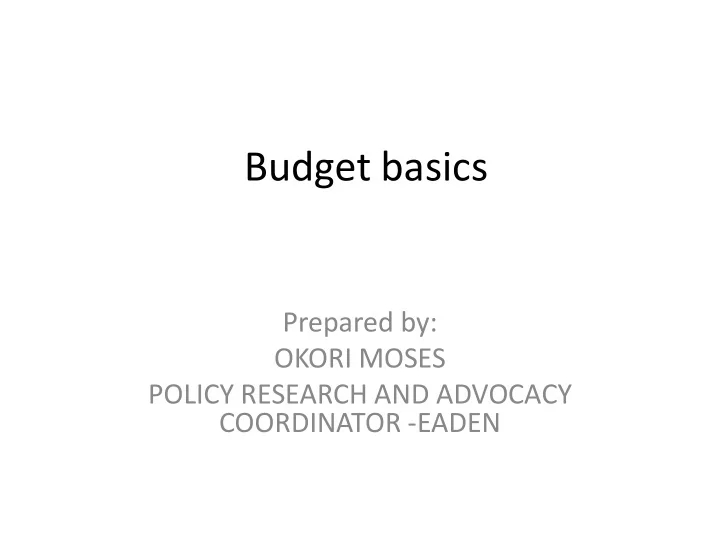

Budget basics Prepared by: OKORI MOSES POLICY RESEARCH AND ADVOCACY COORDINATOR -EADEN
Group Work • 1.What is a Budget? • 2Why is a budget important?
What is a budget? • A budget is: a plan for acquiring resources (revenue) and deploying them in order to achieve policy objectives. • A budget is a detailed plan showing how resources are obtained and how they are put to use during a given period of time (usually a year). • The budget should show how revenue will be raised (where will the money come from) and how the money will be spent (allocation) on planned activities for the coming years.
Why is a budget important? • Goal setting. A budget helps you figure out your long-term goals and work towards them • b.Control. It ensures you don't spend money that you don't have. • c.Helps to plan for your retirement. As important as it is to spend your money wisely today, it's also critical to save for your future. • d.It helps you prepare for emergencies. Life is filled with unexpected surprises, some better than others • e.It sheds light on bad spending habits. Building a budget forces you to take a close look at your spending habits. • f.It helps you manage your finances. When you budget your money wisely, you'll never lose sleep over financial issues
Why do governments prepare budgets • Resources are scarce: Like house hold or family budgets, gov'ts do not have enough money to carry out all the programmes that they want to do. So, they have to carefully plan ahead, an estimate of how much money will be available in the coming financial year. • They prepare budgets in order to provide services to their people through allocating funds to priority areas that are important in improving the incomes and in raising the standards of living of the people
Budget outcomes • A budget is way of planning how the people’s money is to be spent on delivering services to the people. • In a democracy, budgets are supposed to be made for the people and by the people • Budgets are supposed to have three outcomes: a.Fiscal discipline: The amount which is agreed to in a budget must be affordable b.Allocative efficiency: The choices must reflect the priorities that government has set itself. c.Operational efficiency: The government must try to maximize how much value it gets for its money
Principles of budgeting • Principles of good budgeting a.Periodicity: Gov’t should take stock of how much money it has, what its priorities are, & allocate the available money to its priorities b.Predictability: In order for spending agencies (sector & departments) to spend effectively & efficiently, they must be assured of fund flows as planned c.Comprehensiveness: All spending activities should be included on budget. d.Accuracy: Budget information should reflect reality. e.Authority: Money may only be spent on the authority of an institution that is not the spender, i.e. a district Council
Principles of a budgeting -ctd f. Contestability: Having a fair situation where all the choices for any pot of funding can compete on an equal footing. g. Accountability and Transparency g.Gov’t is accountable to the people for its decisions; in allocation and spending h. Transparency: Gov'ts budget decisions are open to public debate and scrutiny i. Transparency is necessary but not sufficient for good budget outcomes; there is for accountability too.
Structure of District Budgets • The district budget should show the funds available, where they come from and the division of funds between functions and services. • A budget provides annual estimates of revenue and expenditure • The district budget has two components: a. A development Budget - capital development projects, which the LG intends to do, continue or complete during a financial year. b.A recurrent budget - how much a LG intends to spend on rendering of each service during a financial year. There are two categories of recurrent budget: Wage – salaries, employ costs etc N on-Wage – goods & services, transport, maintenance etc
Sources of revenue for LGs • Local Gov’ts sources of revenues include: a) Local Revenues Local Service tax; Hotel Tax; Property taxes; Market dues; Trading licenses; Permits; fines; fees etc b) Central Government Transfers Un-conditional grants Conditional grants Equalization grants c) Donor funds They are usually donations from external funders. They are governed by specific guidelines and conditions as agree upon by the funder and the district.
Recommend
More recommend